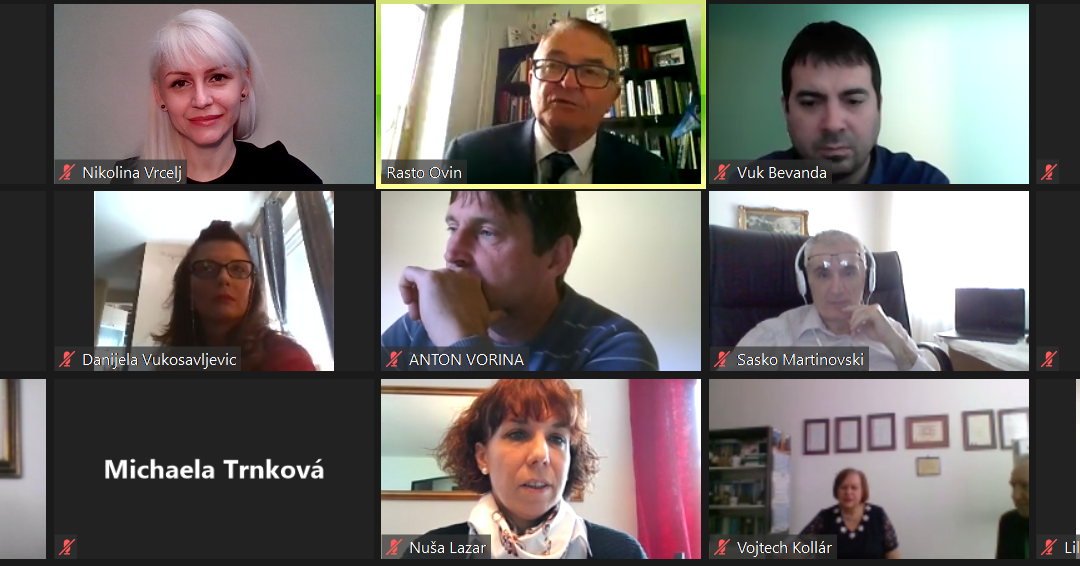Assessing Government Involvement in the Balkan Countries’ Economies
Presiana Nenkova – University of National and World Economy, Department of Finance, Sofia, 8th December str., 1700, Bulgaria
Velichka Nikolova – University of National and World Economy, Department of Economics, Sofia, 8th December str., 1700, Bulgaria
Angel Angelov – University of National and World Economy, Department of Finance, Sofia, 8th December str., 1700, Bulgaria
7th International Scientific ERAZ Conference – ERAZ 2021 – Conference Proceedings: KNOWLEDGE BASED SUSTAINABLE DEVELOPMENT, Online/virtual, May 27, 2021
ERAZ Conference Proceedings published by: Association of Economists and Managers of the Balkans – Belgrade, Serbia
ERAZ conference partners: Faculty of Economics and Business, Mediterranean University, Montenegro; University of National and World Economy – Sofia, Bulgaria; Faculty of Commercial and Business Studies – Celje, Slovenia; AMBIS University, Prague – Czech Republic; Faculty of Applied Management, Economics and Finance – Belgrade, Serbia
ERAZ Conference 2021 Conference Proceedings: ISBN 978-86-80194-46-2, ISSN 2683-5568, DOI: https://doi.org/10.31410/ERAZ.2021
Keywords:
Government;
Fiscal policy;
Balkan countries;
Cluster analysis
Abstract: The extent to which the government intervene the marketplace and the government’s role in the economy is an important factor, determining the economic results achieved by a country. In the academic literature, the question of whether the promotion of this participation contributes to an improvement of the development of a nation or, on the contrary, can contribute to a loss of competitive advantages, is debatable. This study focuses on the degree of involvement of national governments in the economies of the Balkan region countries. For the purpose of analysis, a cluster analysis is applied, through which the Balkan countries are divided into several groups (clusters), characterized by different degrees of government participation. Three periods are considered – before and in the first years of the global economic and financial crisis, as well as just before the current COVID-19 pandemic. The analysis is supplemented by an assessment of the impact of individual clusters on the economic development of these countries.

ERAZ Conference
Creative Commons Non Commercial CC BY-NC: This article is distributed under the terms of the Creative Commons Attribution-Non-Commercial 4.0 License (https://creativecommons.org/licenses/by-nc/4.0/) which permits non-commercial use, reproduction and distribution of the work without further permission.

References
Angelov, A., & Nikolova, V. (2021). The impact of tax burden and tax structure on the economic growth of the Balkan region. Finance, Accounting and Business Analysis (FABA), 3(1), Public Finance Institute, 31-40. http://faba.bg/index.php/faba/article/view/69/36.
International Monetary Fund. (2021). World Economic Outlook Database: April 2021. Retrieved from https://www.imf.org/en/Publications/WEO/weo-database/2021/April/download-entire-database.
Krueger, A. O. (1990). Government Failures in Development. Journal of Economic Perspectives, 4(3), 9-23. https://pubs.aeaweb.org/doi/pdfplus/10.1257/jep.4.3.9.
Nenkova, P., & Angelov, A. (2020). Assessment of the fiscal stances of the Balkan states. Economic Archive, (4), 14-34. https://www2.uni-svishtov.bg/NSArhiv/title.asp?title=1570
Nita, N. (2011). State involvement in the economy through budgetary expenditure. The role of the modern state in the economy. Economy Transdisciplinarity Cognition, 14(1), 156-167. https://www.ugb.ro/etc/etc2011no1/ECO-3-full.pdf.
Steinberg, D. A., & Saideman, S. M. (2008). Laissez Fear: Assessing the Impact of Government Involvement in the Economy on Ethnic Violence. International Studies Quarterly, 52(3), 235–259. https://doi.org/10.1111/j.1468-2478.2008.00500.x.
Stiglitz, J. E. (1997). The Role of Government in Economic Development. In M. Bruno & B. Pleskovic (Ed.), Annual World Bank Conference on Development Economics 1996. Washington, D.C, April 25-26, 1996 (pp. 11-23). The International Bank for Reconstruction and Development / THE WORLD BANK. https://documents1.worldbank.org/curated/ en/467731468767362478/pdf/multi0page.pdf.
Tanzi, V. (1997). The Changing Role of the State in the Economy: A Historical Perspective. International Monetary Fund Working Paper No. 97/114. https://www.imf.org/-/media/ Websites/IMF/imported-full-text-pdf/external/pubs/ft/wp/_wp97114.ashx

